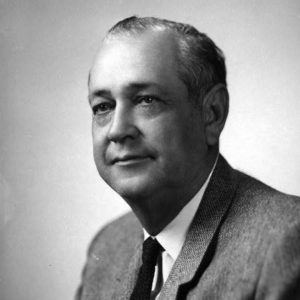calsfoundation@cals.org
Witt Stephens (1907–1991)
aka: Wilton Robert Stephens
Wilton Robert Stephens founded Stephens Inc., which once was the largest brokerage firm off Wall Street. He was a prime mover in the development of the natural gas industry after World War II and exerted great influence on the political and economic fortunes of Arkansas during the second half of the twentieth century.
Witt Stephens was born on September 14, 1907, in Prattsville (Grant County), the second of six children of A. J. “Jack” Stephens and Ethel Pumphrey Stephens. His father was a farmer and politician who served two terms in the Arkansas House of Representatives from Grant County, as would Witt thirty years later (being elected to two terms in the House starting in 1961). The elder Stephens directly influenced his son’s early career moves. As a boy, Witt picked cotton, shined shoes, worked in a sawmill, and peddled peanuts. When Witt graduated from Sheridan High School, the end of his formal education, his father told him he needed to set his sights higher than a life of hand labor and farming.
In 1927, Stephens’s father showed him a magazine advertisement about opportunities selling jewelry. Stephens began selling belt buckles and other jewelry for the National Crafts Co. of Providence, Rhode Island, and sold Bibles on the side. He was an extraordinary salesman, once managing $2,000 in profits while he was in summer camp with the Citizen Military Training Corps at Fort Leavenworth, Kansas. He persuaded the commander to let him set up at a table next to the paymaster, so trainees would assume that they were supposed to spend part of their pay on Stephens’s big brass buckles. National Crafts soon made him regional manager working out of Colorado.
On the advice of his father, he returned to Arkansas in 1932 and set up a partnership with W. H. Thurmond in Little Rock (Pulaski County), trading municipal bonds. Thurmond was a Prattsville neighbor and friend of his father. In 1933, Stephens founded the W. R. Stephens Investment Company.
In 1935, Stephens married Joy Summers, who had a daughter, Frances. His first wife died of cancer in 1954, and in August 1956, he married Bess Chisum. They had three children, Pamela Diane, Elizabeth, and Wilton R. Jr.
Arkansas highway and road bonds, school, levee, and other improvement district bonds were in default during the Great Depression and were selling for as little as ten cents on the dollar. Stephens was confident that Franklin Roosevelt’s Reconstruction Finance Corporation would ensure that government bonds were redeemed, so he invested in them. His intuition paid off when he sold the bonds at a profit, accumulating a small fortune during one of the worst times in modern history. He expanded the investment business and, over time, acquired major holdings in the gas and coal industries, railroads, and even gold mining while personally, along with family members, acquiring an interest in many small banks around the state, which made it easier to market bonds and extend his influence.
In the thirty years after World War II, Stephens was the pre-eminent political power in the state and was often referred to as the “kingmaker.” His money, fund-raising prowess, friendships, and business alliances made and broke political careers and shaped major laws enacted by the legislature. The lobbying efforts and support for officeholders advanced Stephens’s interests in the bond markets and natural gas production.
In 1948, Stephens promoted the ratification of a constitutional amendment to remove the eighteen-mill lid on school taxes, enabling schools to finance hundreds of millions of dollars in school construction. His investment company became the largest school bond underwriter in the state. In the summer of 1948, Stephens raised money and spent heavily for the election of Governor Sid McMath, who promised major efforts to build highways and improve schools. For the next quarter-century, Stephens would play a key role in every campaign for governor and U.S. Senate, notably those of Governor Orval E. Faubus and Senators J. William Fulbright and John L. McClellan, and for scores of lower offices. So many legislators had business or personal connections with Stephens that he had powerful sway on legislation. For example, after the state Supreme Court struck down his formula for passing gas production costs to customers in 1957, Stephens had a bill reinstating the formula approved by both legislative houses and signed into law in four days.
After World War II, Stephens began to acquire extensive natural gas interests and, in a few years, controlled most of the gas production and distribution in the state. When Roosevelt tried to break up utility-holding companies in 1945, Stephens paid $1.2 million for the Fort Smith Gas Co. (now Arkansas Oklahoma Gas Co.). The company owned no gas reserves, so in 1953, Stephens bought the Oklahoma Producing Co. for $6.5 million and assigned its transmission property to his new gas company and the rest to Stephens Production Co., a new natural gas exploration company. Stephens developed vast reserves of natural gas in Arkansas, Texas, Oklahoma, and Louisiana, as well as bituminous coal in Wyoming.
In 1954, Stephens acquired Arkansas Louisiana Gas Co. (Arkla) from Cities Service Co. Arkla had one of the worst earnings records in the business. Over two years, he reorganized the company, cut expenses, wheedled rate increases from the state Public Service Commission, and improved summer gas sales by pushing gas appliances, including gas air-conditioning units. Earnings rose from $1.8 million in 1954 to $7.2 million in 1956. Stephens’s investment company sold most of the stock in the gas company in 1956 to avoid registering as a utility holding company.
In 1956, Stephens became president and chairman of the board of Arkla, leaving the investment company in the hands of his brother, Jackson T. Stephens, who had joined the company in 1946. He extended or improved gas service to scores of communities and new industries with offers of long-term, low-cost contracts. After his retirement from the gas company in 1973, he handpicked his successor, Sheffield Nelson, whom he had hired as his executive assistant. But there soon followed a bitter feud arising principally from Nelson’s refusal to use Arkla’s pipelines to transport gas from the Stephens family’s gas wells to contract buyers farther east. The Stephens-Nelson feud lasted for the rest of the century and profoundly influenced state and even national politics.
After Stephens’s retirement from Arkla, he returned to Stephens Inc. where he dabbled in bond trading and hosted locally famous “cornbread lunches,” at which former political and business adversaries, journalists, and judges shed their old grudges and swapped stories of election hijinks and crafty business deals.
Stephens died of complications from a stroke on December 2, 1991. He is buried at Philadelphia Cemetery at Prattsville.
Stephens was the most influential business leader in Arkansas for thirty years after World War II and played a major role in the economic development of the state. Though he never made speeches or public appearances, his name and folksy image were more familiar to people than any leader outside government. His influence in politics and finance, exercised behind the scenes, was unexcelled.
For additional information:
Dumas, Ernest. “The Stephens Empire—I, Brothers Envy of Wall Street.” Arkansas Gazette. June 26, 1977, pp. 1A , 14A
———. “The Stephens Empire—II, Government ‘Partner’ of Brothers.” Arkansas Gazette. June 28, 1977, pp. 1A, 15A
———. “The Stephens Empire—III, A Legend in State Politics.” Arkansas Gazette. June 29, 1977, pp. 1A, 10A.
Thornton, Raymond H. A. J. Thornton, As Remembered by His Family. Little Rock: August House, 1983.
Ernest Dumas
Little Rock, Arkansas
 Business, Commerce, and Industry
Business, Commerce, and Industry Politics and Government
Politics and Government World War II through the Faubus Era, 1941 through 1967
World War II through the Faubus Era, 1941 through 1967 Stephens Inc. Building
Stephens Inc. Building  Witt Stephens
Witt Stephens 




Comments
No comments on this entry yet.